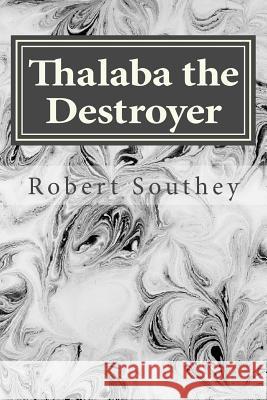Thalaba the Destroyer » książka
Thalaba the Destroyer
ISBN-13: 9781539307778 / Angielski / Miękka / 2016 / 258 str.
Thalaba the Destroyer
ISBN-13: 9781539307778 / Angielski / Miękka / 2016 / 258 str.
(netto: 57,80 VAT: 5%)
Najniższa cena z 30 dni: 59,87
ok. 16-18 dni roboczych.
Darmowa dostawa!
Thalaba the Destroyer is an 1801 epic poem composed by Robert Southey. The origins of the poem can be traced to Southey's school boy days, but he did not begin to write the poem until he finished composing Madoc at the age of 25. Thalaba the Destroyer was completed while Southey travelled in Portugal. When the poem was finally published by the publisher Longman, it suffered from poor sales and only half of the copies were sold by 1804. The poem is divided into twelve "books" with irregular stanza structures and unrhymed lines of poetry. The story describes how a group of sorcerers work to destroy the Hodeirah family in an attempt to prevent a prophecy of their future doom from coming true. However, a young child named Thalaba is able to escape from the slaughter. After one of the sorcerers hunts down Thalaba to kill him, the sorcerer is defeated by a great storm and his powerful magical ring comes into Thalaba's possession. With the ring, Thalaba travels across the Middle East to find a way to defeat the evil sorcerers. In the end, Thalaba is able to stay true to Allah and is guided by the prophet Mohammad in destroying the sorcerers. Southey uses the poem to describe various superstitions and myths, with a heavy reliance on repetition of various themes that link the myths together. Although based in Islamic theology, most of the action is mechanical instead of emphasising possible moral truths that can be drawn from the plot. Though the main character is purported to be a Muslim, the story actually takes place thousands of years before Islam, in ancient Babylon. Critics gave the work mixed reviews, with some emphasising the strong morality within the work or the quality of the poetry. However, other critics felt that the lack of a strong lyrical structure and the use of Middle Eastern myths detracted from the poem.
Zawartość książki może nie spełniać oczekiwań – reklamacje nie obejmują treści, która mogła nie być redakcyjnie ani merytorycznie opracowana.











